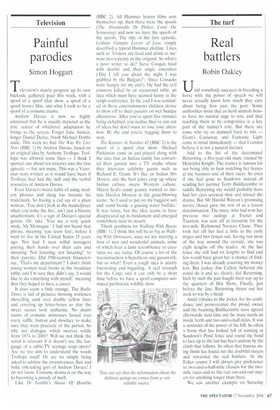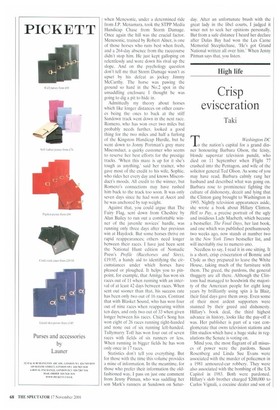The turf
Real battlers
Robin Oakley
Until somebody succeeds in breeding a horse with the power of speech we will never actually know how much they care about being first past the post. Some authorities insist that as herd animals horses have no natural urge to win, and that teaching them to be competitive is a key part of the trainer's role. But there are some who try so damned hard to win — Giant's Causeway and Fantastic Light come to mind immediately — that I cannot believe it is not a natural instinct.
Add to the list of the determined Returning, a five-year-old mare trained by Henrietta Knight. The trainer is famous for not being able to bear watching her horses at the business end of their races. So even if she had gone to Sandovvn instead of sending her partner Terry Biddlecombe to saddle Returning she would probably have had her eyes screwed shut and missed the drama. But Mr Harold Vv'inton's promising novice chaser gave the rest of us a lesson determination. The mare, who had won her previous two outings at Exeter and Taunton, was sent off as favourite for the two-mile Richmond Novices Chase. They took her off her feet a little in the early stages and two fences out, having run most of the way around the outside, she was eight lengths off the leader. At the last fence she still had six lengths to find and few would have given her a chance of finding them. I was already counting my money lost. But jockey Jim Culloty believed she could do it and so, clearly, did Returning. Inch by inch the pair fought their way up to the quarters of Hot Shots. Finally, just before the line, Returning thrust out her neck to win by a head.
Amid tributes to the jockey for his confidence and perseverance the proud owner and the beaming Biddlecombe were agreed afterwards: next time out the mare needs an inside berth and two-and-a-half miles. It was a reminder of the power of the hill. So often a horse that has looked full of running at Sandown's Pond fence and round the bend to face up to the last has been undone by the climb that follows, So often that famous rising finish has found out the doubtful stayers and rewarded the real battlers. At the Esher course I will always give preference to two-and-a-half-mile chasers for the twomile races and to the real out-and-out stayers for anything longer than three.
We saw another example on Saturday when Menesonic, under a determined ride from J.P. Mcnamara, took the STPP Media Handicap Chase from Storm Damage. Once again the hill was the crucial factor. Menesonic, trained by Robert Alner, is one of those horses who runs best when fresh, and a 264-day absence from the racecourse didn't stop him. He just kept galloping on relentlessly and wore down his rival up the slope. And on the psychology question don't tell me that Storm Damage wasn't as upset by his defeat as jockey Jimmy McCarthy. The horse was pawing the ground so hard in the No.2 spot in the unsaddling enclosure I thought he was going to dig a pit to hide in.
Admittedly my theory about horses which like longer distances on other courses being the ones to back at the stiff Sandown track went down in the next race. Romero, who has won over two miles but probably needs further, looked a good thing for the two miles and half a furlong of the Kingston Handicap Hurdle, but he went down to Jonny Portman's grey mare Misconduct, a quirky customer who seems to reserve her best efforts for the prestige tracks. 'When this mare is up for it she's tough as anything,' said her trainer, who gave most of the credit to his wife, Sophie, who rides her every day and knows Misconduct's moods. All credit to the winner. but Romero's connections may have rushed him back to the track too soon. It was only seven days since he had won at Ascot and he was anchored by top weight.
Against that, you could argue that The Fairy Flag, sent down from Cheshire by Alan Bailey to run out a comfortable winner of the juvenile novices' hurdle, was running only three days after her previous win at Haydock. But some horses thrive on rapid reappearances; others need longer between their races. I have just been sent the National Hunt edition of Nomadic Press's Profile (Racehorses and Sires), £19.95, a handy aid to identifying the circumstances under which horses have pleased or ploughed. It helps you to pinpoint, for example, that Amitge has won six races out of 11 when running with an interval of at least 42 days between races. When sent out sooner than that, his success rate has been only two out of 16 races. Contrast that with Blasket Sound, who has won four out of nine races when reappearing within ten days, and only two out of 33 when given longer between his races. Chiefs Song has won eight of 26 races running right-handed and none out of six running left-handed. Tullymurry Toff has won four out of seven races with fields of six runners or less. When running in bigger fields he has won only once in 17 races.
Statistics don't tell you everything. But for those with the time this volume provides a mine of information. In the meantime, for those who prefer their information the oldfashioned way. I pass on just one comment from Jenny Pitman, who was saddling her son Mark's runners at Sandown on Satur
day. After an unfortunate brush with the great lady in the libel courts, I judged it wiser not to seek her opinions personally. But from a safe distance I heard her declare after Dulas Bay had won the Les Came Memorial Steeplechase, 'He's got Grand National written all over him.' When Jenny Pitman says that, you listen.























































































 Previous page
Previous page